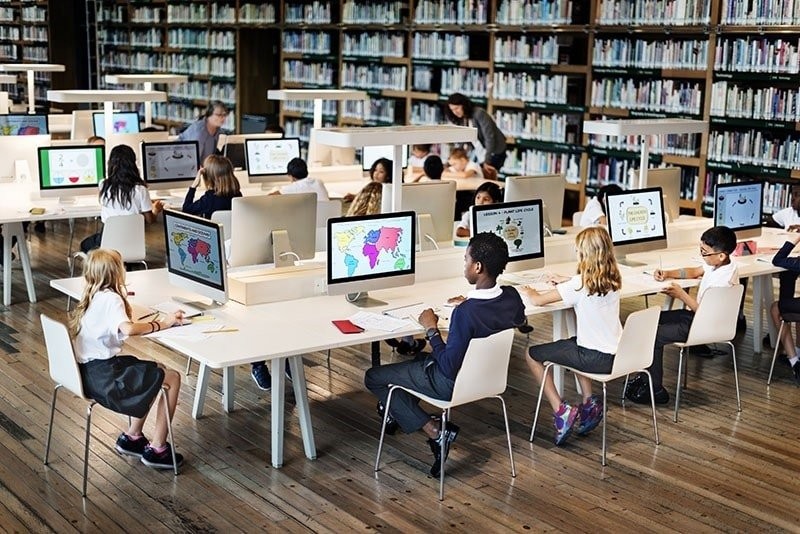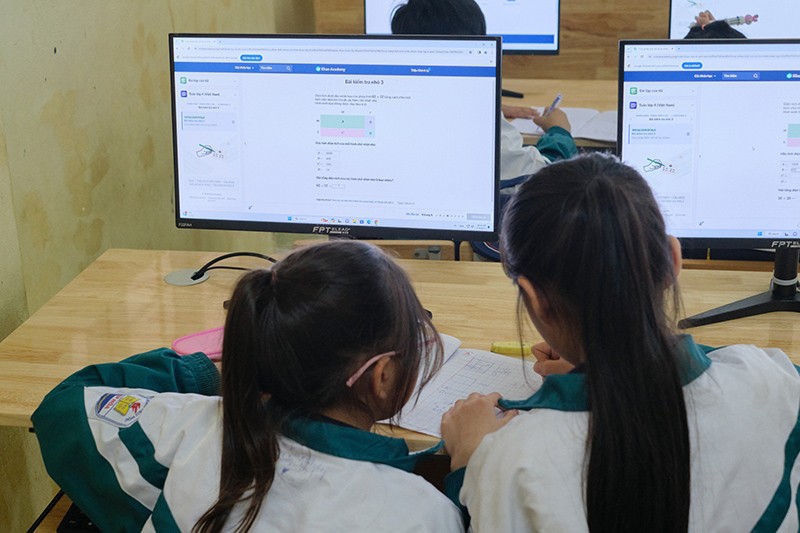
The trend of applying smart-learning platforms in educational digital transformation
Latest
The urgent need for digital transformation in education
Digital transformation in education has been a priority for developed countries, which have been allocating significant resources since the 1990s.
In New York, the emphasis on technology integration within educational settings has been significant since the 1990s, with smart school initiatives highlighting the role of technology in education. In 1997, Malaysia launched its first smart education project, supported by the government, to prepare the workforce for 21st-century challenges. Singapore implemented a master plan in 2006 to establish itself as a Smart Nation, identifying smart education as crucial for national goals. South Korea's SMART education project aimed to reform the educational system and improve infrastructure (Choi & Lee, 2012). In Australia, a smart education system was designed through collaboration with IBM in 2012, enabling multidimensional connections among learners and schools.
 |
| Countries worldwide significantly invest in digital transformation in education |
The United States, the Republic of Korea, and Australia have become pioneers in digital education. The U.S. quickly adopted and developed online educational platforms like Blackboard and Moodle. Today, most universities and colleges in these countries utilize online platforms to offer courses and support learning.
Hale School in Perth, Australia, is an exemplary example of how technology can enhance learning. Students use collaborative tools like Microsoft OneNote and Office 365 for assignments and projects, while teachers provide real-time feedback.
In developing countries, technology offers the potential for improved learning outcomes at lower costs for both teachers and students. Public schools in Brazil and India lead in using the Khan Academy platform and remote live-streaming of lessons. These institutions acknowledge that such online platforms can improve emotional engagement with math subjects for all local children without incurring expenses. By teaching students technology, communication, and collaboration skills, these schools also equip students for a rapidly changing job market.
The trend of integrating smart platforms in teaching and learning
Education and Training are crucial components of a country's competitiveness, with digital transformation representing a shift in individual mindsets and organizational operations within the educational system. In Vietnam, the concept of digital transformation has been widely discussed since 2018. Despite a later start compared to the world, Vietnam is actively embracing digital transformation in education through policies outlined in the "National Digital Transformation Program by 2025, with a vision to 2030" issued by the Prime Minister.
The term "digital transformation" is now familiar to students and teachers in various localities, as schools have been actively applying technology in learning and teaching. This integration includes the organization of online examinations, lesson preparation through specialized software, and electronic lesson plans. Schools are also promoting the development of smart classrooms equipped with modern teaching tools like interactive boards, projectors, internet access, and other advanced educational equipment.
As the most significant educational region in the country, Hanoi's Department of Education and Training (DOET) recognizes the crucial role of digital transformation in implementing comprehensive educational reform and enhancing educational activities and quality.
Therefore, Hanoi schools are investing in modern equipment and exploring teaching software, online learning platforms, and open educational resources. This helps teachers access diverse teaching materials, making lessons more engaging and inspiring for students. Among different initiatives, Khan Academy's teaching application is being implemented in various districts such as Me Linh, Ba Vi, and My Duc.
Ms. Nguyen Thi Thanh Mai, a Grade 3 teacher at Quang Minh A Primary School, Me Linh, Hanoi, shared: "Khan Academy platform is an extremely useful tool that allows me to assign homework and enables students to easily practice exercises on the platform for just 15 minutes a day. This functionality aids teachers in monitoring each student's learning progress."
Mr. Nguyen Danh Cuong, Deputy Head of Ba Vi District's DOET, praised the role of information technology in educational innovation during a training session on using the Khan Academy platform. He stated: "The Khan Academy program is very convenient, especially for math, meeting the Ministry of Education and Training's standards. It is completely free and very suitable for Ba Vi's schools to improve the district's educational quality compared to the citywide average. The Khan Academy platform also supports the LMS teaching and learning method, facilitating students' learning and teachers' assignment and grading processes. This will help narrow the educational gap between suburban and urban areas. Just 30 minutes per week can show students' progress."
According to a recent report from Khan Academy, headquartered in Silicon Valley, USA, Vietnam ranked third globally (excluding the USA) in using the free Khan Academy online learning platform for teaching and learning in schools in 2023.
Khan Academy Vietnam (KAV), a non-profit education program conducted by The Vietnam Foundation (VNF), aims to promote the use of Khan Academy as a powerful digital tool to support schools in Vietnam in their digital transformation efforts, particularly in teaching and learning management. Besides Hanoi, Khan Academy is widely used in many other provinces, including Thanh Hoa, Tuyen Quang, Yen Bai, Dong Nai, and Vinh Phuc.
 |
| Students of Hop Hoa Primary School (Tuyen Quang) are learning at Khan Academy |
At a Khan Academy training session, Ms. Bui Thi Thanh, Deputy Director of Thanh Hoa DOET, stated: "Integrating the Khan Academy platform into digital transformation is crucial. It provides students and teachers with access to an international standard learning environment and represents a key step in optimizing the use of resources and materials, showcasing the collaborative spirit between Thanh Hoa DOET and organizations in enhancing educational quality."
Sharing a similar perspective, Ms. Nguyen Thi Thuy Hang, Principal of Dong Tam Secondary School in Vinh Yen City, Vinh Phuc Province, said: "Our school has implemented teaching and learning on the platform, helping teachers and students utilize rich and useful learning materials. This also allows students to adapt to new learning methods and teachers to adopt new assessment methods, contributing to the school's digital transformation goals."
Recognizing digital transformation in education as a catalyst for global integration, many local DOETs have actively raised awareness among educational leaders and teachers. By applying intelligent platforms in teaching and learning, they reduce the time required to prepare materials and grade, allowing teachers more time to research educational materials, create new teaching methods, and motivate teachers and students. These efforts enhance educational outcomes and equip students to thrive in a digital-centric world.
| TIN LIÊN QUAN | |
| PM Pham Minh Chinh chairs meeting of National Committee for Digital Transformation | |
| Promoting digital transformation in logistics, e-commerce: Workshop | |













